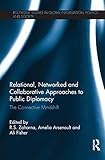Relational, networked, and collaborative approaches to public diplomacy : the connective mindshift / edited by R.S. Zaharna, Amelia Arsenault, Ali Fisher.
Series: Routledge studies in global information, politics and society ; 1.Publisher: New York : Routledge, 2013Description: xiii, 340 pages : ill. ; 24 cmContent type:- text
- unmediated
- volume
- 9780415636070 (hbk.)
| Item type | Current library | Home library | Collection | Call number | Materials specified | Copy number | Status | Date due | Barcode | |
|---|---|---|---|---|---|---|---|---|---|---|
| AM | PERPUSTAKAAN TUN SERI LANANG | PERPUSTAKAAN TUN SERI LANANG KOLEKSI AM-P. TUN SERI LANANG (ARAS 5) | - | JZ1305.R458 (Browse shelf(Opens below)) | 1 | Available | 00002115814 |
'Over the past decade, scholars, practitioners, and leading diplomats have forcefully argued for the need to move beyond one-way, mass-media-driven campaigns and develop more relational strategies. In the coming years, as the range of public diplomacy actors grows, the issues become more complexly intertwined, and the use of social media proliferates, the focus on relations will intensify along with the demands for more sophisticated strategies. These changes in the international arena call for a connective mindshift: a shift from information control and dominance to skilled relationship management. Leading international scholars and practitioners embark on a forward-looking exploration of creative conceptual frameworks, training methods, and case studies that advance relational, networking, and collaborative strategies in public diplomacy. Light on academic jargon and rich in analysis, this volume argues that while relationships have always been pivotal to the practice of public diplomacy, the relational dynamics are changing. Rather than focus on specific definitions, the contributors focus on the dynamic interplay of influence in the public diplomacy environment. That environment includes state and non-state actors, public and private partners, competitors and collaborators, new and old media, and is conditioned by power, ethics, and cultures. This book is an essential resource to students and practitioners interested on how to build relationships and transform them into more elaborate network structures through public communication. It will challenge you to push the boundaries of what you think are the mechanisms, benefits, and potential issues raised by a relational approach to public diplomacy.'--Publisher's website.
There are no comments on this title.

